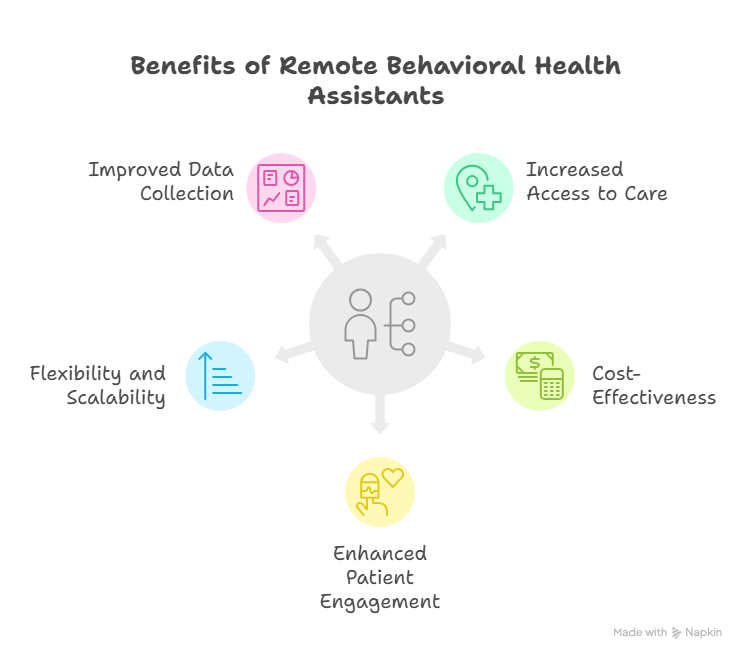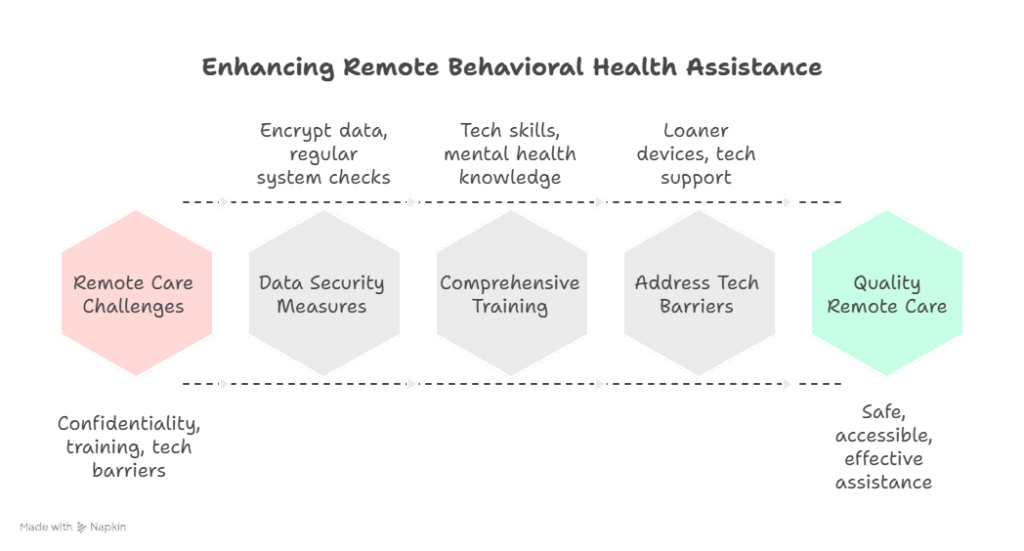Behavioral Health Assistant: Key Benefits of Hiring Remotely
01 Oct 2025 By: Mary Dellosa
Updated

Telehealth is changing how we care for each other. As more people get help from home, behavioral health assistants are stepping in to offer real support and connection.
Hiring a remote Behavioral Health Assistant helps providers, patients, and the wider mental health field. This article shares key benefits, data, real cases, and expert views.
Understanding the Role of a Behavioral Health Assistant
What Does a Behavioral Health Assistant Do?
Behavioral health assistants help licensed providers with care, admin tasks, and support work. They screen patients, track progress, and share mental health info. Though they don’t diagnose or treat, Behavioral Health Assistants boost care by taking on routine tasks. This lets clinicians focus on planning and complex decisions.
Patients may feel safer opening up to Behavioral Health Assistants first. This support builds trust and improves care. Behavioral Health Assistants also help in crises. They give quick support, use de-escalation skills, and guide patients through tough times, shaping both recovery and safety.
The Evolution Toward Remote Behavioral Health Assistance
The pandemic pushed telehealth forward fast, especially in mental health care. Now, remote behavioral health assistants help people through video, phone, and online tools. This setup keeps care going strong, no matter where someone lives. It also makes it easier to get help from home without fear or travel issues.
A 2023 report found that remote mental health visits jumped over 50% since before COVID. People are now more open to getting care online. A behavioral health assistant uses apps, support groups, and other tools to keep people involved and on track. As tech grows, so will their ways to reach and support others.
Key Benefits of Hiring a Remote Behavioral Health Assistant

1. Increased Access to Care
Remote Behavioral Health Assistants help more people get care, especially in rural areas with few mental health providers. Long waits and missed care often hurt these communities. They step in with quick support and follow-up, keeping patients on track.
Talking to a behavioral health assistant from home also eases fear or shame around getting help. This helps more people feel safe enough to open up and ask for support.
Remote Behavioral Health Assistants also reach those who can’t travel, live with disabilities, or just feel more at ease getting care from home. This creates a more open, equal care space for all.
2. Cost-Effectiveness and Resource Optimization
Hiring remote Behavioral Health Assistants helps cut costs. They don’t need office space, and flexible online work lowers overhead for clinics and care teams. Behavioral Health Assistants also take on support tasks, freeing up licensed providers to focus on tough cases or see more patients. This boosts care and keeps programs strong.
Fewer missed visits from remote check-ins also means more steady income. Patients can show up without travel or timing issues getting in the way.
Training costs drop too. Behavioral Health Assistants can learn online, which saves time and money. Clinics can then focus on growing skills and keeping care quality high.
3. Enhanced Patient Engagement and Satisfaction
Remote Behavioral Health Assistants give patients a steady, trusted contact outside therapy. Their check-ins and support help patients stay motivated and stick to their care plans. A 2022 APA survey found 68% of patients felt more supported with a BHA. This trust leads to better results and more honest talks about symptoms.
Behavioral Health Assistants send simple check-ins, help set goals, and offer kind words. These small acts remind patients someone cares and they’re not facing things alone.
When support is steady, people start to feel grounded again. They open up more, feel safe being honest, and know someone truly cares and is there for them.
4. Flexibility and Scalability
Remote Behavioral Health Assistants give care teams the freedom to grow fast when more help is needed. They can be added quickly without needing more office space. This helps big clinics and community centers handle busy times. Behavioral Health Assistants can also match patient needs, like language or personal background.
That means care feels more personal and respectful. Patients get support that fits who they are, which helps build stronger trust. With this flexibility, clinics can keep care strong even as needs shift. They can also launch programs like crisis help or group sessions when needed.
5. Improved Data Collection and Care Coordination
Remote Behavioral Health Assistants use digital tools and EHRs to track care in real time. This helps care teams stay in touch and work together smoothly. Clear notes show what’s helping, catch problems early, and guide better care when things need to change.
Behavioral Health Assistants also help patients, families, and staff stay in sync. By using shared data, care feels more connected and less confusing. Everyone works together to support the patient’s mental health journey.
Telehealth tools also show trends over time, helping clinics improve care for all. This leads to smarter programs and better results for the whole community.
Addressing Challenges and Ensuring Quality in Remote Behavioral Health Assistance

Maintaining Confidentiality and Security
Keeping patient info safe matters most in remote mental health care. Clinics need to follow privacy laws like HIPAA and use tools that truly protect people’s data.
Remote Behavioral Health Assistants need training on safe ways to talk and handle records. Clear steps build trust and help keep personal info safe. Using encrypted tools and checking systems often can stop data leaks. This shows patients their safety matters and builds trust in the care team.
Ensuring Proper Training and Supervision
To help remote Behavioral Health Assistants do their best, strong training is key. They need to learn tech tools, understand mental health, and work well with people from all backgrounds. Licensed clinicians should guide them with regular check-ins and case reviews. Good platforms make this easier by linking teams in real time.
Behavioral health Assistants also grow through workshops and support groups. Learning new skills keeps them sharp and ready to give better care every day.
Overcoming Technological Barriers
Not everyone has strong internet or a device, which can make remote care harder. Some may need loaner devices, phone calls, or local help to stay connected. Providers should check a patient’s tech setup early and adjust care to fit their needs. Simple tools and tech support also make a big difference.
When care is easy to access, more people can join in and get help. This builds stronger communities and makes sure no one gets left behind.
Future Trends and the Growing Importance of Remote Behavioral Health Assistants
Integration with Artificial Intelligence and Digital Therapeutics
New tools like AI and digital therapy are helping remote Behavioral Health Assistants do more. AI can track symptoms, spot risks, and suggest support that fits each patient. With this tech, BHAs can step in sooner and offer smarter help. For example, AI can flag signs a patient may be slipping before things get worse.
Digital tools also give patients extra support between sessions, like helpful apps or exercises. This keeps them involved and on track with care.
Expanding Roles and Professional Development
As demand for mental health care grows, remote Behavioral Health Assistants will take on bigger roles. With more training, they’ll handle complex tasks under a clinician’s guidance. This helps clinics and gives BHAs real career paths. With time and skill, they can shape care plans and improve how support is delivered.
Their growth supports better care for all and helps build a team that keeps learning, improving, and leading in mental health innovation.
Trending Now
Burnout is a major issue in mental health, affecting up to 67% of staff. It links to poor job satisfaction, health issues, and lower care quality. Despite the harm, few interventions exist. Most studies show burnout stays stable or worsens without help. Training programs, coping strategies, and organizational changes can reduce burnout, but research is limited and mostly outside the U.S. Future studies must use better designs and focus on both individual skills and system-level fixes. Building meaningful, long-term support programs is key to keeping mental health workers well.
Frequently Asked Questions
Conclusion
Hiring a remote Behavioral Health Assistant helps more people get care, saves money, and gives real support to both patients and teams. As more people reach out, BHAs offer a simple, caring way to meet that need right when and where it’s needed.
Clinics using remote Behavioral Health Assistants often see big changes, stronger care, better teamwork, and patients who feel listened to and cared for. With the right tools and support, BHAs help build a kinder system that puts people first, every step of the way.
Ready to boost your mental health services? HelpSquad Health’s virtual assistants are trained, reliable, and ready to support your team and your patients. Explore HelpSquad Health today and see how our remote Behavioral Health Assistants can improve care, cut costs, and keep your patients engaged. Let’s build better care together.


